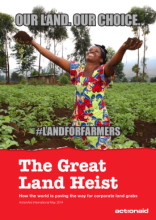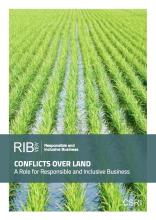Land Library
Welcome to the Land Portal Library. Explore our vast collection of open-access resources (over 74,000) including reports, journal articles, research papers, peer-reviewed publications, legal documents, videos and much more.
/ library resources
Showing items 1 through 9 of 197."For millions of people living in the world’s poorest countries, access to land is a matter not of wealth, but of survival, identity and belonging.
In line with the conventional view that customary land rights impede agricultural development, the traditional tenure system in Nigeria has been perceived to obstruct the achievement of efficient development and agricultural transformation.
Food First Backgrounder, Spring 2014, Vol. 20, No. 1
Introduction: Land, Race and the Agrarian Crisis
This briefing paper makes the case for proactive business engagement in respecting land rights and ensuring legal, fair and inclusive practices on land use, access to natural resources and equitable development opportunities.
This guide provides tools to understand the Voluntary Guidelines on the responsible Governance of Tenure, which sometimes uses technical language that is not easy to understand for those who are not used to reading this kind of text.
The “Voluntary Guidelines on Responsible Governance of Tenure of Land, Fisheries, and Forests in the Context of National Food Security” (VGGT), endorsed by the Committee on World Food Security (CFS) in 2012, set out principles and internationally accepted standards for responsible practices and i
Guide to determine if monitoring is actually a viable activity that can be undertaken by their organisation.
La présente loi comporte trois cent vingt sept (327) articles, et est constituée sept (7) titres, notamment) De la délimitation, de la dénomination et des chefs-lieux des Collectivités territoriales décentralisées (Titre I); Des attributions des organes des Collectivités territoriales décentralis
Indonesia comprises more mangroves than any other country, but also exhibits some of the highest mangrove loss rates worldwide. Most of these mangrove losses are caused by aquaculture development.









